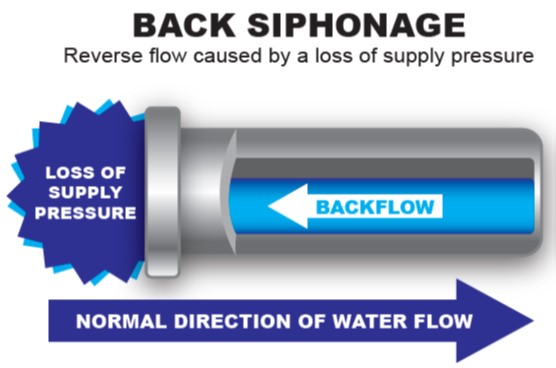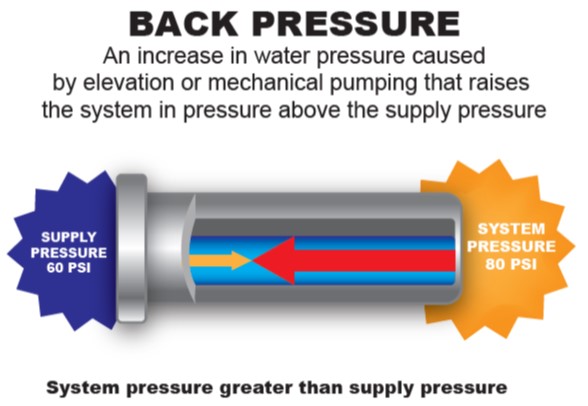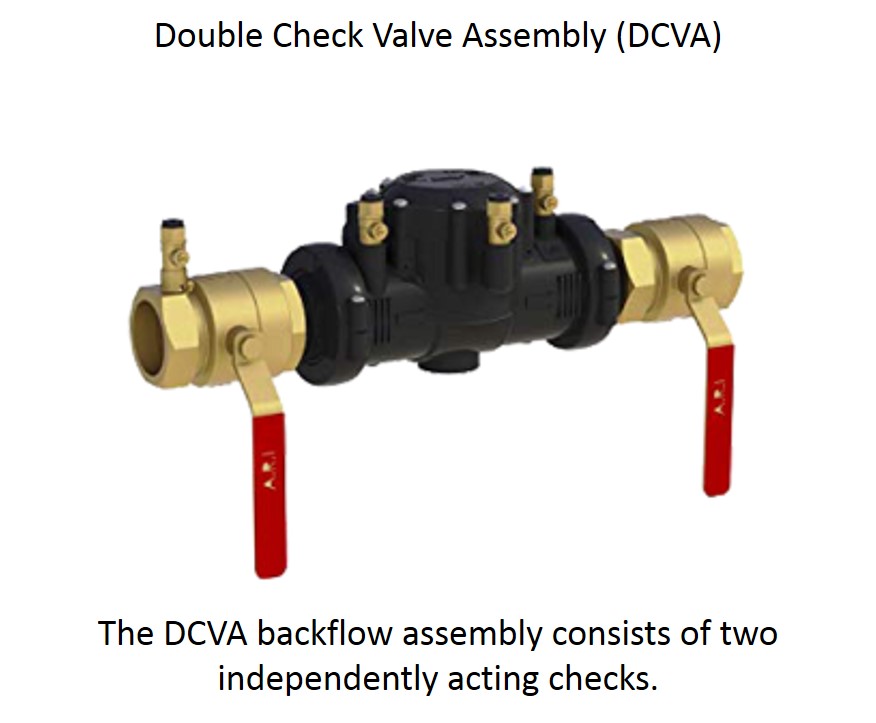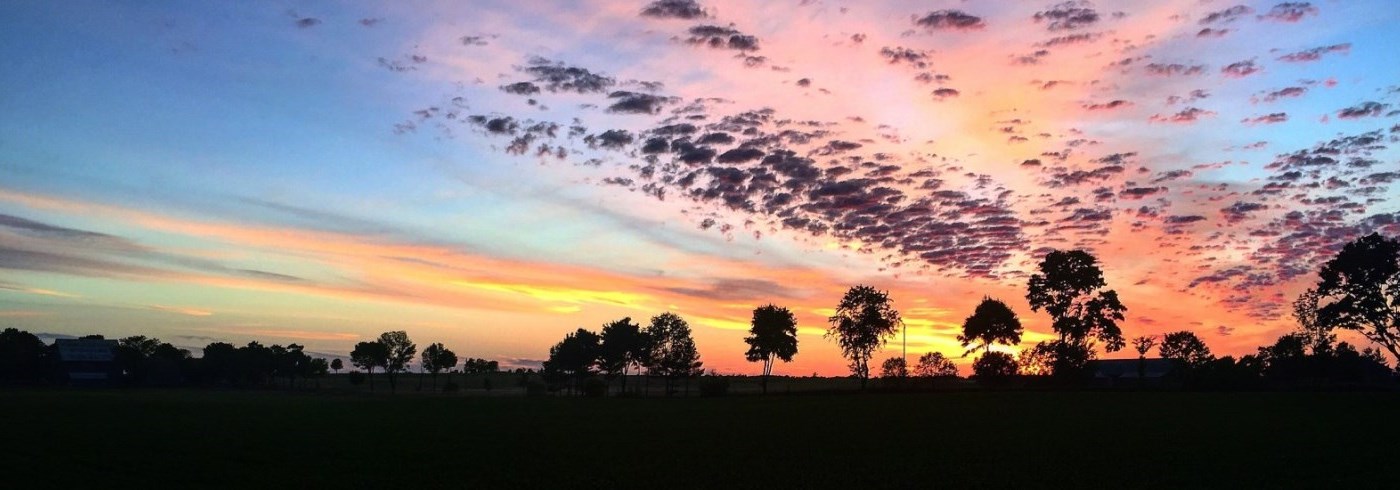Backflow Prevention Program
On June 13, 2018 Durham Regional Council passed Backflow Prevention by-law 24-2018, to implement a backflow prevention program that will add to Durham Region’s multi-barrier approach to safe drinking water. The by-law requires that a backflow preventer for premise isolation is installed, tested and maintained annually on all water services that could pose a hazard to the municipal drinking water system.
About Backflow
The water in Durham Region’s municipal drinking water system is meant to flow in one direction. Backflow is the undesired reversal of flow from a building or facility back into the drinking water system that is caused by either back siphonage or back pressure.
 Back Siphonage
Back Siphonage
Back siphonage occurs when there is a partial vacuum in the drinking water system from large water taking events such as a water main break or firefighting activities. This vacuum may draw contaminated water back into the drinking water system.
 Back Pressure
Back Pressure
Back pressure occurs when there is a connection to a non-potable water supply operating at a higher pressure than the drinking water system. Back pressure can be created by booster pumps, temperature increases in boilers or elevated piping. This increased pressure may push contaminated water back into the drinking water system.
Why Backflow Prevention is Important
Backflow events have the potential to contaminate the water in the distribution system, which can cause implications for human health and safety. Canada has a history of backflow incidents highlighting the importance of backflow prevention programs.
Oakville, Ontario
In 2011, an Oakville High School had to be closed due to cleaning chemicals entering its water lines. A backflow device successfully prevented any impact to the local water supply.
Stratford, Ontario
In 2005, Stratford residents discovered pink tap water following a backflow event at a local car wash. Residents of Stratford went without water for two days.
Edmonton, Alberta
In 2002, an Edmonton high rise had blue caustic water flowing from the taps. The cause was backflow from the heating system after repairs to internal water lines. The issue took two weeks to correct.
Guelph, Ontario
Petroleum chemicals back siphoned from a industry into Guelph's Drinking Water System in 1997 impacting approximately 50,000 residents.
Premise Isolation
Premise isolation means a backflow prevention device installed at the municipal water connection to a building or facility. It is usually installed immediately downstream of Durham Region’s water meter. All other backflow prevention devices beyond premise isolation are the responsibility of the local building department.
Backflow Prevention Device
A backflow prevention device is installed on a water service to protect the drinking water system from backflow contamination. There are two types of backflow prevention devices for premise isolation:
High or Severe Hazard
Any type of cross-connection or potential cross-connection involving water that has additives or substances, that, under any concentration, can create a danger to health. This type of hazard requires a backflow prevention device known as a Reduced Pressure Principle Assembly (RP).

Moderate Hazard
A connection that has a low probability of becoming a high or severe hazard. This category includes, but is not limited to, connections involving water where the aesthetic qualities of the water have been reduced and, under certain conditions, can create a danger to health. This type of hazard requires a backflow prevention device known as a Double Check Valve Assembly (DCVA).

Who is affected?
By-law 24-2018 will apply to all industrial, commercial, institutional and multi-residential properties classified as severe or moderate hazards in the Canadian Standard Association (CSA) B64 series standard.
Durham Region's Responsibilities |
|
Property Owner Responsibilities |
|
The program requires property owners to have the following completed by a qualified contractor in accordance with the Authorized Functions List of the by-law. Cross Connection Survey Report The survey identifies connections to the drinking water system and any potential on-site hazards that may exist. Hazards identified as severe or moderate will require the installation of a backflow prevention device. This survey must be completed every five years or after any of the following conditions are met:
|
Cross Connection Control Program Test Program |
|
The test report verifies backflow prevention devices have been installed, tested and maintained in accordance with CSA standards. All devices require testing and maintenance on an annual basis. Durham Region has retained records of all test reports submitted within the past year. Test reports indicating compliance with the by-law do not require resubmission as they have been uploaded to BSI's records. Surveys will still be required for all affected properties. |
Qualified Contractor
A person certified by the Ontario Water Works Association, or other governing body as approved by Durham Region, to conduct backflow prevention installation, testing, and maintenance. Contractors must also be qualified to conduct work in accordance with the authorized functions list of the by-law. Durham Region strongly recommends obtaining multiple quotes and does not endorse or provide recommendations of services or prices.
Contractors Responsibilities |
|
Backflow Solutions Inc. (BSI)
BSI has been contracted to administer the cross connection survey reports and cross connection control program test reports.
View qualified contractor list.
Program Costs
The costs associated with retaining a qualified contractor to conduct the cross-connection control survey report and installation, testing and maintenance of the backflow prevention devices are the responsibility of the property owner. There is no fee to submit cross-connection control survey reports or register authorized testers. There is a $25 fee (subject to annual increases) for each test report submitted to be paid online at the time of submission.
Steps to Program Compliance
Step 1 |
|
Property owner receives notification from Durham Region to conduct a cross connection control survey report for premise isolation.
|
Step 2 |
| The property owner must hire a qualified contractor to conduct the survey. Contractors must be qualified to conduct the work in accordance with the authorized function list set out in the by-law. See authorized functions list below in the by-law. |
Step 3 |
| The contractor must submit the survey online through BSI's website for Durham Region to review. Surveys must be completed and submitted within 90 days of receiving notification from Durham Region. |
Step 4 |
|
Based on the results of the survey, Durham Region will issue a notice with one of the following instructions:
Notice to install a backflow prevention device. The results of the survey indicate that a backflow prevention device is required for premise isolation or existing backflow prevention is not appropriate for the hazard class. The property owner must retain a qualified contractor to install the appropriate device. Must be completed within 180 days of receiving notification from Durham Region.
Notice to repair an existing backflow prevention device. The results of the survey indicate that an existing device needs repair. The property owner must retain an authorized tester to repair and test the device. Must be completed within 180 days of receiving notification from Durham Region.
Notice to test an existing backflow prevention device. The results of the survey indicate that an existing device needs testing. The property owner must retain an authorized tester to test the device. Must be completed within 180 days of receiving notification from Durham Region. |
Step 5 |
| Durham Region will begin tracking all backflow prevention devices for premise isolation. Property owners will be notified in advance when their device is due for annual testing. A cross connection survey control report shall be competed every five years from the date of the first requested survey, subsequent any tenant or ownership change, re-zoning of property, change of process or chemical use or as required by the Commissioner of Works. |
Related Links
Contact Us





